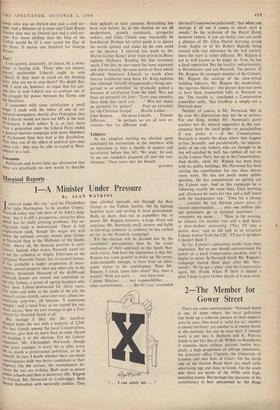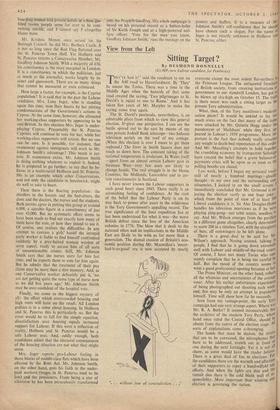2—The Member for Gower Street
There are some constituencies—Norwich South is one of them—where the local politicians can build up a coherent picture of their support, area by area. One ward is 'solid for us'; another is enemy territory; yet another is in enemy hands at the moment, but can be won back if enough work is put into it. Holborn and St. Pancras South is not like this at all. Within its boundaries it contains three railway stations, twelve hos- pitals, a high proportion of old-age pensioners, the Spectator office, Cypriots, the University of London and two Inns of Court. On the north side of the Euston Road there are small cafes advertising egg and chips in Greek. On the south side there are hotels of the 1930s with high- sounding names. But perhaps the character of the constituency is best epitomised by the dingy
boarding-houses and private hotels in whose gas- filled rooms people seem for ever to be com- mitting suicide, and I cannot say I altogether blame them.
Mr. Krishna Menon once served on the Borough Council. So did Mrs. Barbara Castle. It is not so long since the Red Flag fluttered over the St. Pancras Town Hall. Yet Holborn and St. Pancras returns a Conservative Member, Mr. Geoffrey Johnson Smith. With a majority of 656, his constituency is the most marginal in London. It is a constituency in which the politician, just as much as the journalist, works largely by in- stinct and guesswork. There are so many things that cannot be measured or even estimated.
How large a factor, for example, is the Cypriot population? It is said that in the past the Labour candidate, Mrs. Lena Jeger, who is standing again this time, won their hearts by her stirring condemnations of the Government's actions in Cyprus. At the same time, however, she alienated her working-class supporters by appearing to be anti-British. In this election Mrs. Jeger is, under- playing Cyprus. Presumably the St. Pancras Cypriots will continue to vote for her, while her working-class supporters will return. But no one can be sure. Is it possible, for instance, that resentment against immigrants will work to Mr. Johnson Smith's advantage? This much is cer- tain. if resentment exists, Mr. Johnson Smith is doing nothing whatever to exploit it. Indeed, he is prepared to go further; to say that he be- lieves in a multi-racial Holborn and St. Pancras. His is an example which other Conservatives, and not only the candidate in Smethwick, might do well to take to heart.
Then there is the floating population : the dwellers in the hostels and the bed-sitters, the dons and the doctors, the nurses and the students. Both parties agree in putting this group at around 6,000, a sizeable figure in a constituency of just over 43,000. But no systematic effort seems to have been made to find out exactly how many of them have the vote, 'or how they intend to use it. Of course, one realises the difficulties. In any attempt to canvass a girls' hostel the intrepid party worker is liable to find himself confronted suddenly by a grey-haired woman warden of stern aspect, ready to accuse him of all sorts of unmentionable crimes. Still, Mr. Johnson Smith says that the nurses were for him last time; and he expects them to vote for him again. But he admits that the treatment of their pay claim may be more than a dim memory. And, as one Conservative worker delicately put it, 'we are not getting quite the same type of nurse now as we did five years ago.' Mr. Johnson Smith may be over-confident of the hospital vote.
Finally, we come to the biggest mystery of all: the effect which overcrowded housing and high rents will have on the result. All London politics is in a sense about housing. In Holborn and St. Pancras this is particularly so. But the error would be to fall for the simple equation, dissatisfaction over housing equals increased support for Labour. If this were a reflection of reality, Holborn and St. Pancras would be a safe Labour seat. And, oddly enough, both candidates admit that the electoral consequences of the housing situation are not what they might seem.
Mrs. Jeger reports pro-Labour feeling in those blocks of middle-class flats which have been affected by the Rent Act. Mr. Johnson Smith, on the other hand, puts his faith in the under- paid workers .(wages in St. Pancras tend to be • low) and the pensioners. From being a star of television he has been miraculously transformed
into the PeopletrGeoffrey. His whole campaign is based on his personal record as a button-holer of Sir Keith Joseph and as a high-powered wel- fare officer. 'Vote for the man you know, Geoffrey Johnson Smith.' runs the message on the posters and leaflets. It is a measure of Mr. Johnson Smith's self-confidence that he should have chosen such a slogan. For the name of Jeger is not exactly unknown in. Holborn :Ind St. Pancras, either.















































 Previous page
Previous page